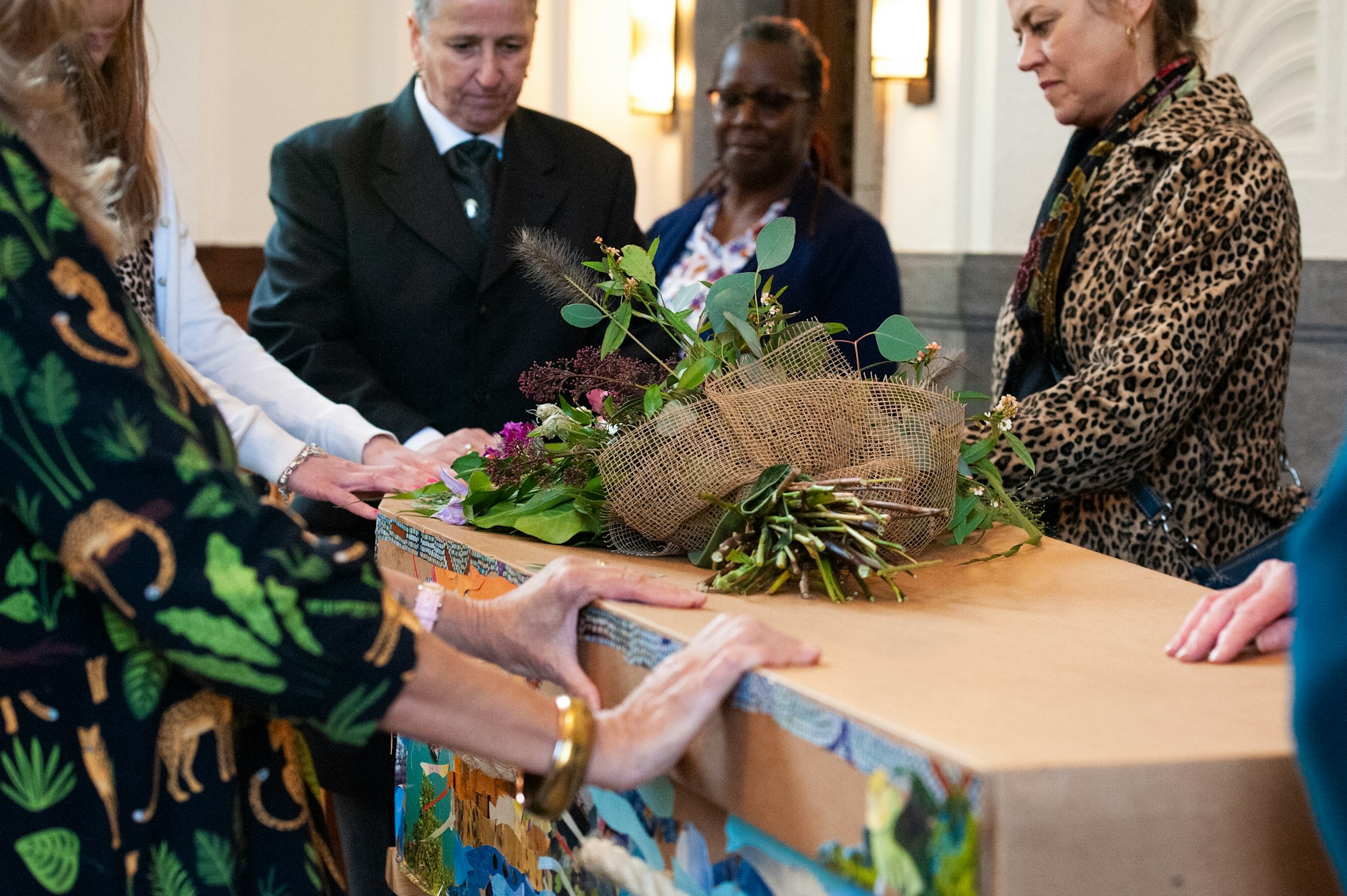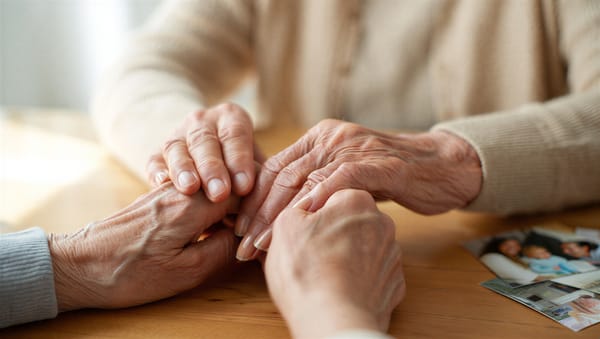Anniversary Grief Explained: Why Sadness Returns and How to Cope
Grief can resurface around anniversaries, birthdays, and milestones. Learn why these emotional waves return, how to honor your loved one’s memory, and find healthy ways to cope with anniversary grief.

You're approaching the one-year mark since your loved one died, and you notice something unexpected: the grief you thought had softened is suddenly overwhelming again. You find yourself crying in the grocery store, struggling to sleep, or feeling that familiar heaviness you experienced in the early days of loss. Your first thought might be, "Haven't I already processed this? Why does it hurt so much again?"
This experience has a name: anniversary grief. It's the intensification of grief reactions that occurs around significant dates connected to your loss, such as the death anniversary, birthday, holidays, or other meaningful occasions you shared together. Research in grief psychology consistently shows that these temporal markers trigger powerful emotional responses, even years after a loss (Rando, 1993).
Anniversary grief happens because our brains are wired to remember. When you experience something as emotionally significant as losing someone you love, your brain creates strong neural pathways connecting the event to the time of year it occurred. These pathways include environmental cues like the changing seasons, the quality of light, even the songs playing on the radio. As the calendar cycles back to that time, your brain recognizes the temporal pattern and activates the emotional memories associated with it, often before you consciously realize what's happening (Shear, 2015).
Several specific triggers amplify grief around anniversaries. Environmental cues like weather patterns, seasonal changes, or holiday decorations can activate implicit memories you didn't even know you stored. Social expectations surrounding holidays or milestones can create additional pressure, as you navigate celebrations that feel hollow without your person. The anticipation itself often proves more difficult than the actual day; many people report that the weeks leading up to an anniversary feel worse than the anniversary itself. Finally, your own internal timeline matters. For some, the first anniversary hits hardest; for others, the second or third year brings unexpected intensity as the initial shock wears off and the permanence of loss settles in.
Key Takeaways
- Anniversary grief is a normal, predictable intensification of grief that occurs around significant dates related to your loss
- Your brain naturally creates neural pathways that link specific times of year to memories and emotions, triggering anniversary reactions
- Grief doesn't follow a linear timeline; waves of sadness around anniversaries don't mean you're "going backwards" in your healing
- Planning ahead for difficult dates, creating meaningful rituals, and allowing space for both grief and joy can help you navigate anniversary periods
- Physical reminders and tangible connections to your loved one can provide comfort during anniversary times when emotional pain feels especially acute
Reflections on love, loss, and the ways we carry them.
Anniversary grief has a way of sneaking up on you. You might be having an ordinary day when, and without warning, you feel that familiar heaviness. A certain date, a season, even a scent seems to stir something deep within. This isn’t a setback. It’s your emotional memory quietly remembering what your conscious mind may have set aside.
Anniversary grief is different from complicated grief. It doesn’t mean you haven’t “moved on” or that you’re grieving wrong. Rather, it’s your heart marking sacred time. The birthday that now feels quieter, the Christmas table with one less chair, the season when everything changed.
I recall working with Liza, who lost her husband three years ago. She told me, “Every March, I feel the weight all over again. I used to fight it by keeping myself busy and pushing through. But when I finally learned that this was simply anniversary grief, I began to treat the month gently. I light a candle, cook his favorite meal, and allow myself to feel.” That small act of compassion toward herself transformed her pain into remembrance.
Our bodies, like our hearts, hold memory. When these dates return, give yourself grace. Mark the moment in a way that feels right. Visit a favorite place, share stories, hold something tangible that connects you to your loved one. For some families, solidified remains have offered comfort, allowing them to hold or carry a piece of their loved one on meaningful days.
Grief isn’t a straight line; it circles back with love as its compass. When those waves come, don’t ask, “Why am I feeling this again?” Instead, whisper, “Of course I am.” Because remembering, even through tears, is another way of loving.
Cathy Sanchez Babao
Parting Stone Grief Coach
What Anniversary Grief Is (and Isn't)
Anniversary grief represents a natural recurrence of grief feelings triggered by calendar dates, holidays, birthdays, or seasonal changes that remind you of your loved one or their death. It's your emotional system remembering, even when your conscious mind tries to focus elsewhere. This differs significantly from complicated grief, which is characterized by persistent, intense grief that doesn't soften with time and significantly impairs daily functioning beyond expected anniversary reactions.
Understanding what anniversary grief looks like helps you recognize it in yourself. You might experience emotional symptoms such as sudden crying spells, increased irritability or anger, feelings of guilt or regret about the loss, or renewed questioning about the death. Physical manifestations can include changes in sleep patterns or appetite, fatigue or low energy, headaches or body tension, or a general sense of heaviness or malaise. Cognitively, you may notice difficulty concentrating, preoccupation with memories of your loved one, intrusive thoughts about the death itself, or feeling mentally foggy or disconnected.
Behaviorally, anniversary grief often leads to withdrawing from social activities, avoiding places or events that remind you of the person, increased visits to the gravesite or memorial location, or compulsive reviewing of photos and mementos.
It's crucial to understand what anniversary grief is not. It doesn't mean you haven't "dealt with" your grief properly or that you're failing at grieving. It's not a sign that you need to "get over it" faster, nor does it indicate that something is wrong with you. Anniversary grief also doesn't mean your grief will always be this intense; the acute pain typically lasts days to weeks, not permanently.
One family member described their experience this way: "My mother passed away in 2021, and every year as Christmas approaches, I feel her absence more acutely. I thought I was doing something wrong, that I should have 'processed' this by now. Understanding that anniversary grief is a normal part of loving someone who died has given me permission to feel what I feel without judgment."
@chloebluffcakes Thank you @partingstone 🤍 youve given me an unimaginable gift. One day I will share these with my little sister and carry her wherever we go in life together. #grief #partingstone #loss
♬ Repeat Until Death - Novo Amor
The Science Behind Anniversary Reactions
The psychological mechanisms underlying anniversary grief involve several interconnected processes. Temporal conditioning occurs when our brains associate specific times of year with traumatic or significant events, creating automatic emotional responses when those times return (Zisook & Shear, 2009). Memory reactivation happens as anniversaries trigger both explicit memories (conscious recollections) and implicit memories (unconscious emotional and sensory memories). Additionally, anticipatory grief in the weeks leading up to an anniversary often intensifies emotions as you mentally prepare for the difficult date.
From a neurobiological perspective, research using brain imaging has revealed fascinating insights. Studies show that thinking about a deceased loved one activates similar neural networks to those activated when the person was alive, essentially "reactivating" the relationship in your brain (O'Connor et al., 2008). The amygdala, your brain's emotional processing center, shows heightened activity during grief responses, particularly around anniversaries. Stress hormone levels, including cortisol, often increase in the weeks surrounding an anniversary date, which can explain physical symptoms and emotional vulnerability.
The role of ritual and meaning-making proves particularly important during anniversary periods. Anthropological research across cultures shows that anniversary rituals serve critical psychological functions. They provide structured time for remembering, create opportunities for family connection, offer symbolic actions that express continuing bonds with the deceased, and help integrate loss into your ongoing life narrative (Romanoff & Terenzio, 1998).
Jarek from Warwick, Rhode Island 🖤, who lost his mother, shared his journey with creating meaningful remembrance traditions: "My mom wanted to be cremated so some of her ashes could go back to Poland to be buried next to her mom. Cremating gave us time to pick the perfect gravesite near her home on Cape Cod. We had over 30 people at the graveside service, many of whom could not make it to the wake. It was another celebration of her life with a champagne toast to send her off in style! Today, her solidified remains are with every family member serving as a healing moment every time we hold them. I take her everywhere I go. I even take her on my sales calls. We plan to leave some at her favorite ski trails, the pond she swam across in the summers, and close to a bench at her work where she dedicated over 45 years to scientific research."

When Anniversary Grief Appears: Understanding the Timeline
Anniversary grief doesn't follow a predictable intensity pattern; different time markers carry different emotional weight for different people. The first anniversary often brings the most intense anticipatory anxiety as you navigate each "first" without your loved one: first birthday, first holiday season, first death anniversary. Many people report that actually reaching these dates provides some relief; the anticipation proved worse than the day itself.
The second and third years present their own challenges. After the acute shock of the first year fades, the permanence of loss often settles in more deeply during years two and three. Some people find the second anniversary harder than the first because they're no longer surrounded by the same level of social support or active grieving rituals. The third year often marks a transition point where grief becomes more integrated into your life rather than dominating it.
As years pass, significant milestone anniversaries (five years, ten years, twenty-five years) can trigger renewed grief intensity. These markers prompt reflection on how much life has changed, how much time has passed, and how your loved one missed witnessing important life events. The grief at milestone anniversaries often has a different quality: less raw shock, more bittersweet longing, and a deeper appreciation for the ongoing impact of the loss.
Seasonal patterns also influence anniversary grief beyond specific dates. Many people notice increased grief intensity during certain seasons, even if they can't immediately identify why. This happens because our brains store sensory memories connected to time of year: the angle of sunlight, temperature changes, seasonal scents, and ambient sounds. You might feel inexplicably sad each fall because autumn was when your loved one died, even if you're not consciously thinking about the death.

Holiday periods present compounded grief challenges. Holidays like Thanksgiving, Christmas, Hanukkah, or family celebration days carry expectations of togetherness and joy, making the absence of your loved one feel especially pronounced. Sarah from Detroit, Michigan 🖤, whose father died on December 26, 2014, described creating new anniversary traditions: "We had my dad's ashes for a while but weren't sure what to do with them. When we found Parting Stone, we figured it would be the perfect way to honor him as well as ensure loved ones had part of him too. We have been so happy because my dad loved to travel. So every vacation we now take, we take a stone to leave in the most beautiful place we can find. It helps bring me peace to know my dad is surrounded by all of the most beautiful places in the world."
Birthday anniversaries of your loved one carry unique poignancy. These dates celebrate the person's existence rather than their death, yet their absence makes the celebration impossible in its original form. Many families create new rituals around birthday anniversaries, finding ways to honor the person's life and mark the passage of time.
Understanding Normal Anniversary Grief vs. Complicated Grief
While anniversary grief is a normal part of the grief process, it's important to recognize when grief reactions indicate a need for professional support. The following table outlines key differences:
| Normal Anniversary Grief | Signs That May Indicate Complicated Grief |
|---|---|
| Intense but temporary increase in grief around specific dates | Persistent, unrelenting grief that doesn't soften with time |
| Ability to anticipate and somewhat prepare for difficult dates | Complete inability to think about or plan for the future |
| Gradual return to baseline functioning after anniversary passes | Prolonged impairment in work, relationships, or daily activities |
| Mixture of sadness and positive memories | Predominant feelings of bitterness, anger, or numbness |
| Ability to find meaning or comfort in rituals and remembrance | Avoiding all reminders of the deceased or obsessive preoccupation |
| Grief responses are proportionate to the significance of the date | Grief reactions that seem to intensify rather than integrate over years |
Research suggests that approximately 7-10% of bereaved individuals develop complicated grief (also called prolonged grief disorder), which requires specialized therapeutic intervention (Shear et al., 2011). If your anniversary grief feels unmanageable, persists for extended periods, or significantly interferes with your ability to function, reaching out to a grief counselor or therapist specializing in bereavement can provide valuable support.
Chris's son died before he got to embark on the cross-country train trip that he had planned. Learn how solidified remains are helping him go on the journey he never got to take.
Coping Strategies That Actually Help
Navigating anniversary grief requires both preparation and flexibility. These evidence-based strategies can help you move through difficult anniversary periods with greater ease:
1. Acknowledge and Anticipate
Rather than trying to ignore approaching anniversary dates, acknowledge them openly. Mark your calendar with significant dates and give yourself permission to prepare emotionally. Share your awareness with trusted friends or family members who can offer support. Many people find that simply naming the approaching date and saying, "This might be a hard week for me" reduces some of the anticipatory anxiety.
2. Create Meaningful Rituals
Rituals provide structure for grief and opportunities for active remembering. These don't need to be elaborate; they just need to feel meaningful to you. Some families light a candle, share a meal, visit a significant location, or engage in an activity the deceased person loved. The key is creating intentional space to honor both your loved one's memory and your grief. Barbara from Allen, Texas 🖤, whose husband died in 2025, found comfort in ritual: "I feel a part of him is always with me. At some point, I can place a part of him somewhere he loved in a more beautiful form than just ashes."
3. Balance Solitude and Connection
Different people need different things during anniversary periods. Some need quiet solitude for reflection; others need the distraction and support of being around people. Neither approach is better; what matters is honoring your actual needs rather than what you think you should need. Consider planning some structured alone time as well as some time with supportive people, giving yourself flexibility to adjust based on how you're feeling.
4. Maintain Self-Care Basics
Grief is exhausting, and anniversary grief often disrupts sleep, appetite, and energy levels. During difficult anniversary periods, prioritize the fundamentals: adequate sleep (even if that means naps), nourishing food (even if you're not hungry), gentle movement (walking often helps more than intense exercise), and limiting alcohol (which can intensify depression and disrupt sleep).
5. Allow Space for All Emotions
Anniversary periods often bring complicated mixtures of emotions. You might feel intense sadness, unexpected anger, guilt about moments of joy, or numbness. All of these are normal. Rather than judging your emotions or trying to force them away, practice simply noticing: "I'm feeling very sad right now" or "I'm noticing anger coming up." This observational stance, recommended by grief therapists, can help you experience emotions without being overwhelmed by them (Neimeyer, 2016).
6. Modify Traditions Thoughtfully
Holidays and recurring events often require reimagining traditions. You might keep some traditions exactly as they were, modify others to acknowledge the loss, and create entirely new traditions. There's no right way to navigate this; what matters is making conscious choices rather than simply trying to recreate what's no longer possible. One family noted: "We started Christmas Eve dinner at our house, beginning with Mom's blessing and ending with everyone sharing a favorite Mom memory. Grief and joy aren't opposites; they're dance partners."
7. Document Your Journey
Writing, creating art, or recording voice memos about your experience can help process anniversary grief. This isn't about creating anything polished; it's about externalizing internal experiences. Many people find that writing about their grief, even in fragments, provides a sense of release and helps them notice patterns in their grief over time.
8. Seek Professional Support When Needed
If anniversary grief feels overwhelming, therapy can help. Grief counselors can offer specific tools for managing anticipatory anxiety, creating meaningful rituals, and processing complicated emotions. Support groups, either in-person or online, can also help you feel less alone in your experience.

Finding Comfort in Tangible Connection
During anniversary periods when grief feels especially acute, many families find comfort in having physical reminders of their loved one that they can see, hold, and interact with. This speaks to a fundamental human need during grief: maintaining some form of continuing bond with the person who died.
Psychologists have moved away from older grief models that emphasized "letting go" toward understanding that healthy grief often includes finding ways to maintain connection while simultaneously adapting to the loss (Klass, Silverman, & Nickman, 1996). Physical objects play an important role in this process. A piece of jewelry, a photograph, a meaningful object that belonged to your loved one, these items serve as what researchers call "linking objects," providing tangible connection when the person themselves is no longer physically present.
Some families have found particular meaning in having solidified remains that can be held, shared among family members, and brought to significant places during anniversary times. Janet from Troy, Michigan 🖤, whose husband died in 2014, shared her experience: "My husband and I traveled extensively until he passed suddenly. Now my daughter and I take one of his stones to every country we visit and leave it, so we are able to feel the closeness of him still enjoying his love of travel with us. I am actually surprised by the closeness we feel to him, as we look for the most meaningful spot to leave his stone on every trip."
Parting Stone's solidification process transforms cremated remains into smooth, stone-like forms that families can divide, hold, and incorporate into remembrance rituals. The process takes approximately 8-10 weeks and returns the full amount of cremated remains in solid form. Unlike traditional urns that remain stationary, solidified remains offer portability and shareability. During difficult anniversary periods, some families find comfort in holding a stone, bringing a stone to a memorial location, or creating new traditions around placing stones in meaningful places.
Mary from Prescott, Arizona 🖤, who lost her husband in 2021, explained: "Friends and family joyfully accept and even request stones, some to keep, some to leave at places memorable to them and our departed loved one. As a widow, I found solidified remains to be a valuable and comforting way to grieve, to remember shared experiences and to invite my late husband along on new adventures. We all carry stones with us, wherever we go, as a constant reminder of the good times and the love."
This approach isn't right for everyone, and it's certainly not the only way to maintain connection with someone who died. What matters is finding what brings you comfort during the inevitable difficult moments that anniversaries bring, whether that's a photograph, a piece of clothing, a journal, or something else entirely that helps you feel connected to your loved one's memory.

Navigating Specific Types of Anniversary Dates
Different types of anniversary dates carry different emotional weights and may require different approaches:
Death Anniversaries
The anniversary of the death itself often triggers the most intense grief, particularly in the first few years. The day may bring back vivid memories of the death, especially if you were present. Some people prefer to take the day off work, while others find structure and distraction helpful. Creating a specific plan for the day, whether that's visiting a meaningful location, gathering with loved ones, or engaging in an activity your loved one enjoyed, can provide both structure and purpose.
Birthday Anniversaries
Your loved one's birthday represents who they were and the life they lived, not just their death. Some families choose to celebrate these days, baking a favorite cake, sharing favorite memories, or doing activities the person loved. Others find birthday anniversaries too painful to mark actively. Both responses are valid; the key is making a conscious choice about how you want to acknowledge the day.
Holiday Anniversaries
Holidays amplify grief because they're designed for togetherness and celebration, making absence more pronounced. The cultural expectation to be happy during holidays can make you feel isolated in your grief. Many families find success in mixing tradition with innovation: keeping some beloved traditions while also acknowledging that holidays will inevitably feel different. Planning ahead helps; last-minute decisions made while emotionally overwhelmed rarely feel satisfying.
Wedding Anniversaries
For those who've lost a spouse, wedding anniversaries can be particularly bittersweet. These days marked joy and commitment; now they mark absence. Some people remove their wedding rings on significant anniversaries as a symbolic acknowledgment that their relationship has changed form. Others continue wearing their rings indefinitely. There's no timeline you should follow; this is deeply personal.
Milestone Anniversaries
Five-year, ten-year, or other milestone markers often prompt reflection on how much time has passed and how much your life has changed. These anniversaries might bring renewed grief intensity but often also bring a sense of perspective. You might notice that while the grief hasn't disappeared, it has changed shape. You've learned to carry it differently.
When Grief Waves Come Unexpectedly
Sometimes anniversary grief catches you off guard. You might find yourself overwhelmed by sadness in a random moment, only to realize later that it's near the time of year your loved one died or that you're approaching a significant date you hadn't consciously remembered. This phenomenon, sometimes called "anniversary reactions," happens because your body and unconscious mind remember even when your conscious mind doesn't.
These unexpected grief waves don't mean something is wrong. They're your system's way of honoring the significance of loss, even when you're not actively thinking about it. When these moments hit, practice self-compassion. If possible, give yourself space to feel what's coming up. If you're somewhere you need to hold it together (at work, in public), acknowledge to yourself "I'm having a grief moment" and promise yourself you'll make time later to sit with the feelings.
Karen from San Diego, California 🖤, whose mother died in 2020, described this experience: "My mother passed away during COVID and she sat in a box for years. When I finally felt ready to do something, I divided the solidified remains up and sent them to her eight grandchildren, three children, and husband. I know some have her on their mantle; my daughter carries one in her car so she can talk to Nana when she's driving. I have taken some on vacation with me, and if the place is somewhere I think my mother would have loved, I have left a stone there. When I went to Bruges with my son, I dropped her in the canal near the swans. I knew she would have thought this was a fairytale destination, and it made me feel at peace."


Finding Your Own Way Forward
Anniversary grief reminds us that grief doesn't follow a straight line. It circles back, intensifies at predictable times, and occasionally ambushes us when we least expect it. This isn't a failing of your grief process; it's evidence of your love. The pain you feel around anniversaries is proportionate to the significance of the relationship. People we love casually don't haunt our anniversaries; people we love deeply do.
As you navigate anniversary dates, remember that there's no prescribed way to grieve correctly. What works for one person might not work for you. What helps during one anniversary might not help during the next. Grief is adaptive; it requires you to stay curious about what you need rather than rigidly following a plan.
The goal isn't to eliminate anniversary grief, which may never fully disappear. The goal is to find ways to navigate these difficult periods with slightly more ease, to create meaning from your memories, and to honor both your loved one's memory and your own continuing life.
Some years the anniversary will devastate you. Other years it might pass more gently. Both experiences are normal. Your grief is changing as you change, as time passes, as your relationship with the loss evolves. Anniversary grief is part of that evolution, a reminder that love doesn't end when life does. The grief you carry is testimony to the connection you shared, and the difficult anniversaries are simply your heart remembering what it doesn't want to forget.
Frequently Asked Questions
Is anniversary grief normal, even years after a loss?
Yes, anniversary grief is completely normal and can occur for years, even decades, after a loss. The intensity typically softens over time, but significant dates may always carry some emotional weight. Research shows that grief doesn't follow a linear timeline with a clear endpoint; rather, it becomes integrated into your life in a way that allows for both continuing bonds with your loved one and adaptation to their absence. Anniversary reactions at five, ten, or twenty years post-loss don't indicate you haven't healed properly; they indicate the depth of your connection to the person who died.
How long does anniversary grief typically last?
Anniversary grief typically intensifies in the days or weeks leading up to a significant date and may continue for several days to a few weeks after the date passes. The acute intensity usually doesn't last indefinitely. Many people notice that the anticipation of the anniversary feels worse than the day itself. The duration and intensity vary based on factors including how recent the loss was, the nature of your relationship, your support system, and whether you've created meaningful rituals around the date.
What triggers anniversary reactions beyond specific calendar dates?
Anniversary reactions can be triggered by sensory cues associated with the time of year: the smell of autumn leaves if your loved one died in fall, the sound of holiday music, the quality of light during a certain season. Weather patterns, seasonal activities, and annual events can all activate grief responses. Additionally, seeing others celebrate occasions with their loved ones present can trigger grief about your loved one's absence, even if the specific date isn't an anniversary for you.
How do I cope when anniversary grief interferes with my daily functioning?
If anniversary grief significantly interferes with work, relationships, or daily activities, consider reaching out to a grief counselor or therapist specializing in bereavement. Professional support can help you develop specific coping strategies and determine whether you might be experiencing complicated grief that requires therapeutic intervention. In the shorter term, be proactive about self-care: communicate your needs to employers or loved ones, simplify your schedule around difficult dates when possible, and give yourself explicit permission to function at a reduced capacity during the most intense periods.
Should I try to avoid reminders of my loved one around anniversaries, or should I lean into them?
There's no single right answer; people need different things. Some benefit from actively engaging with memories through planned rituals and remembrance activities. Others need more distance and distraction during intensely difficult periods. Many people find a middle ground: acknowledging the significance of the date while also maintaining some normal activities. Pay attention to what your body and emotions are telling you rather than following rules about what you "should" do. Your needs may also change from year to year.
How can I support someone else experiencing anniversary grief?
The most valuable support is often simply acknowledging the significance of the date: "I know this week marks a year since your mom died. I'm thinking of you." Offer specific, practical help rather than vague "let me know if you need anything" statements. Be comfortable with their discomfort; you don't need to fix their grief or make them feel better. Your willingness to sit with them in their sadness, remember their loved one with them, or provide distraction when they need it matters far more than saying the perfect thing.
References
Klass, D., Silverman, P. R., & Nickman, S. (Eds.). (1996). Continuing bonds: New understandings of grief. Taylor & Francis. https://doi.org/10.4324/9781315800790
Neimeyer, R. A. (2016). Meaning reconstruction in the wake of loss: Evolution of a research program. Behaviour Change, 33(2), 65-79. https://doi.org/10.1017/bec.2016.4
O'Connor, M. F., Wellisch, D. K., Stanton, A. L., Eisenberger, N. I., Irwin, M. R., & Lieberman, M. D. (2008). Craving love? Enduring grief activates brain's reward center. NeuroImage, 42(2), 969-972. https://doi.org/10.1016/j.neuroimage.2008.04.256
Rando, T. A. (1993). Treatment of complicated mourning. Research Press.
Romanoff, B. D., & Terenzio, M. (1998). Rituals and the grieving process. Death Studies, 22(8), 697-711. https://doi.org/10.1080/074811898201227
Shear, M. K. (2015). Complicated grief. New England Journal of Medicine, 372(2), 153-160. https://doi.org/10.1056/NEJMcp1315618
Shear, K., Frank, E., Houck, P. R., & Reynolds, C. F. (2005). Treatment of complicated grief: A randomized controlled trial. JAMA, 293(21), 2601-2608. https://doi.org/10.1001/jama.293.21.2601
Zisook, S., & Shear, K. (2009). Grief and bereavement: What psychiatrists need to know. World Psychiatry, 8(2), 67-74. https://doi.org/10.1002/j.2051-5545.2009.tb00217.x










